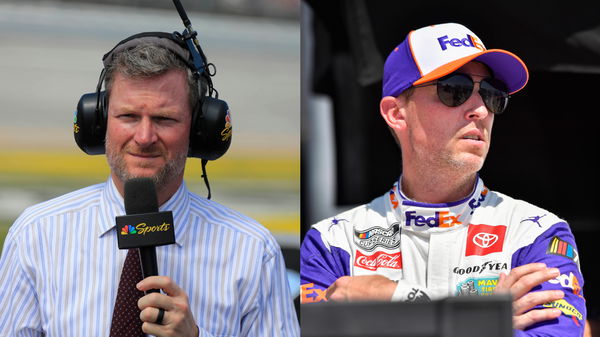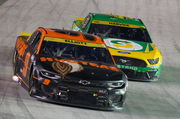
via Imago
Dale Earnhardt Jr and Denny Hamlin | Image Credits: Imago

via Imago
Dale Earnhardt Jr and Denny Hamlin | Image Credits: Imago
Despite quitting competitive NASCAR racing, Dale Earnhardt Jr remains an influential figure in the community. Whether it be topics about on-track racing developments or even business deals off-track, Dale Jr’s opinions, for the most part, are inclined toward those of the drivers and team, but he isn’t sure about the idea of teams having permanent charters in NASCAR in ongoing negotiations.
There has been a lot of back and forth between NASCAR and Team Alliance in trying to come to terms with a new charter deal. However, with both parties holding their ground, there’s no clear roadmap for where NASCAR racing could be headed by the start of 2025. Co-owner of 23XI Racing and JGR driver Denny Hamlin shared his take on the deadlock situation with a statement via X: “Permanent charters don’t cost anything.”
Surprisingly, Dale Earnhardt Jr wasn’t too convinced by this and rather took a stance for Jim France. Explaining the pitfalls NASCAR is trying to avoid by inking a permanent charter deal with the Cup Series teams.
ADVERTISEMENT
Article continues below this ad
Dale Jr emphasizes the importance of TV and media rights deals to counter the permanent charter arguments
Since 1949, the France family has been running the show, and going forward, Jim France wants to see this legacy continue. Permanent charters not only give the team a share of equal power but also put NASCAR in a sticky position. Especially with the share of revenue for TV and media rights deals. This is what Dale Earnhardt Jr was trying to explain during a special segment of Ask Jr via YouTube.
“I believe if the teams get permanent charters. Then NASCAR is obligated to support those charters through the agreement, giving them that amount of money per race that they ought to get right and getting that guarantee. Well, if TV rights just up and went away, right? You don’t know for sure where the TV rights are going to be in five or ten years.” Jr argued during the show.
NASCAR might have bagged themselves a lucrative 7.7 billion dollar new TV deal that runs until 2031. But agreeing to a permanent charter risks them shelling out millions of dollars in case there’s a shift in the TV landscape and broadcasters are looking to go the streaming route. With TNT and Amazon Prime Video making their entry into the new TV deal, NASCAR is yet to tap into the full potential of streaming networks.

USA Today via Reuters
Feb 19, 2024; Daytona Beach, Florida, USA; NASCAR Cup Series drivers Corey LaJoie (7), Kyle Busch (8) and A.J. Allmendinger (16) race three wide for the lead during the Daytona 500 at Daytona International Speedway. Mandatory Credit: Mark J. Rebilas-USA TODAY Sports
“If NASCAR knew for eternity we’re going to make hundreds of millions on dollars on TV, they would probably be more comfortable making the charters permanent because they can then financially support the agreement forever. But until they can financially know that they can support that agreement, I don’t know if they can make that commitment.” Jr went on to add.
However, if we are to go by the latest developments, it’s NASCAR that currently holds the leverage over the situation, having secured the TV deal.
ADVERTISEMENT
Article continues below this ad
Trending
Scenarios that could play out in the ongoing negotiations?
The latest proposal NASCAR made to the teams was a seven-year extension with the option of an additional year to extend the current charter agreement. This is indeed far from the demands made by the teams to have a permanent charter. While the sport has progressed and stabilized in recent years, it’s far from the peak NASCAR racing days of the early 2000s, when sponsorship and TV ratings were at an all-time high.
So could we see teams boycotting the Daytona 500 race in 2025? All because they couldn’t get their big piece of the pie from the revenue model. While it might sound far-fetched, NASCAR did face a similar situation back in 1969. Richard Petty and other drivers refused to take the field at Talladega in the racetrack’s inaugural run over the issue of tire durability. NASCAR didn’t put up with the complaints and rather fielded workers and drivers inside the race cars and completed the race.
ADVERTISEMENT
Article continues below this ad
Such a scenario is difficult to pan out in the modern era of racing. Neither NASCAR nor the teams would like to find themselves in such a predicament. So, what could be the silver bullet that could put these charter negotiation battles to rest? Unfortunately, the answer lies with teams taking a step back from their demands of a permanent charter, as NASCAR certainly isn’t willing to back down from its governing role.
Essentially, it’s NASCAR who owns the racetracks and the sport, so even if teams decide to start their own rival stock car racing series, it is hard to see them go up against the influence and power of NASCAR. All of this again is just the far-fetched imagination of what a doomsday scenario might look like. However, given the track record of past charter negotiations, it is likely that the two parties will find a middle ground and agree to a new deal soon.
ADVERTISEMENT
ADVERTISEMENT
ADVERTISEMENT
ADVERTISEMENT







